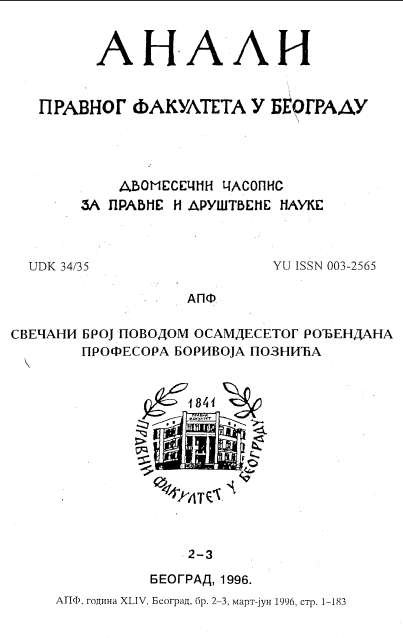О СМИСЛУ РАЗЛИКОВАЊА ФОРМАЛНЕ И МАТЕРИЈАЛНЕ ПРАВНОСНАЖНОСТИ
THE SENSE OF DISTINGUISHING BETWEEN FORMAL AND SUBSTANTIVE LEGAL VALIDITY
Author(s): Goran SvilanovićSubject(s): Law, Constitution, Jurisprudence
Published by: Правни факултет Универзитета у Београду
Keywords: Legal validity; Formal and substantial.
Summary/Abstract: Distinguishing between the formal and substantive legal validity prevails both in the domestic civil procedure law literature and among the authors of Austria, Germany and Switzerland. This is a traditional standpoint The author accepts the opinions expressed by various domestic authors regarding the inappropriateness of this dichotomy, as well as regarding the legal validity as an undivided phenomenon. A judgment becomes full and valid according to lawmaker’s determination. One of the consequences of the above is a relative incontestableness of the final decision (namely, incontestablcness through regular legal remedies). The essence of the legal validity is in the obligatoriness, in terms of law, of the decision of the court, which is expressed in several different aspects, i.e. as the obligatoriness of the rules of conduct otherwise prescribed within it — for the parties and the courts, as a prohibition of another trial in the same matter, and the like. After the time limit has expired for lodging extraordinary legal remedies, namely after such remedies have failed after being lodged, the judgment becomes finally full and valid. In such a way a rule of conduct as expressed by the court decision becomes effective in practice (in real life). However, the legal validity of a judgment, either relative or finally incontestable, does not lead to various degrees of legal obligatoriness, although sometimes it may look so in practice.
Journal: Анали Правног факултета у Београду
- Issue Year: 44/1996
- Issue No: 2-3
- Page Range: 140-153
- Page Count: 14
- Language: Serbian

